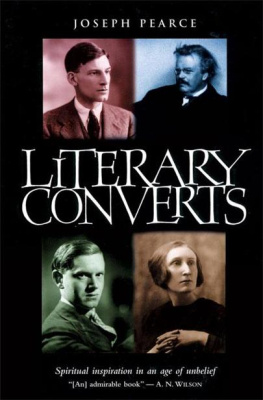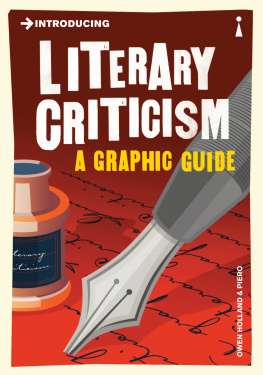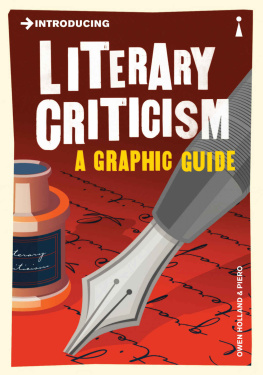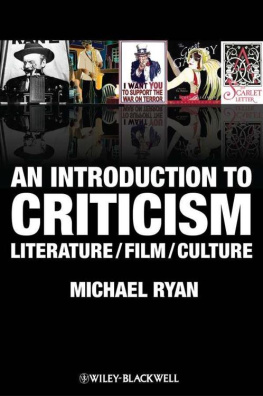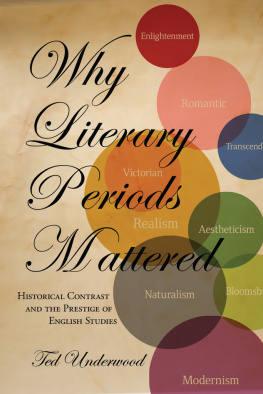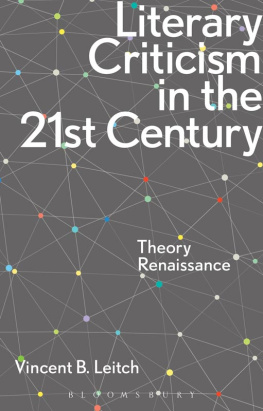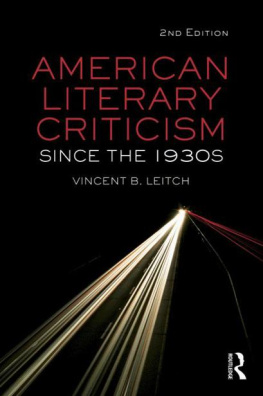JOSEPH NORTH
Literary Criticism
A Concise Political History


CAMBRIDGE, MASSACHUSETTS, AND LONDON, ENGLAND 2017
Copyright 2017 by the President and Fellows of Harvard College
All rights reserved
Jacket image: Fatesun Thinkstock
Jacket design: Annamarie Why
978-0-674-96773-1 (hardcover)
978-0-674-97853-9 (EPUB)
978-0-674-97851-5 (MOBI)
978-0-674-97852-2 (PDF)
The Library of Congress has cataloged the printed edition as follows:
Names: North, Joseph, 1980 author.
Title: Literary criticism : a concise political history / Joseph North.
Description: Cambridge, Massachusetts : Harvard University Press, 2017. | Includes bibliographical references and index.
Identifiers: LCCN 2016046677
Subjects: LCSH: CriticismHistory20th century. | CriticismHistory21st century. | CriticismPolitical aspects. | Neoliberalism.
Classification: LCC PN94 .N67 2017 | DDC 801/.950904dc23
LC record available at https://lccn.loc.gov/2016046677
Contents
I N THIS BOOK , I offer a rapid, synoptic overview of the basic paradigms that have governed the academic criticism of literature in much of the English-speaking world for the last century or so. If this is not the most pressing matter of our time, it is not the least pressing one, either. The study of literature is a test casejust one test case, but an important onefor a larger question that many people, I take it, acknowledge as central: the question of how and to what extent the societies in which we live allow us to cultivate deeper modes of life.
People write histories of many different kinds, and for many different reasons. It may therefore help readers to frame and evaluate the book if I begin by saying a few words about the kind of history it is intended to be. Clearly, it is not an exhaustive history. No attempt has been made to cover allor even mostof the major figures and movements in the history of literary criticism. Some important figures and movements do appear, of coursein fact, the book is largely structured around a very short list of individual figuresbut many that were obviously central to the history of literary studies appear only in the notes, if indeed they appear at all. Nor, I am afraid, is it a particularly illustrative history: it has little interest in painting a rich and detailed picture of the periods it describes, nor in bringing the reader into close imaginative contact with the minds of historical actors. Lastly, it is not an evaluative history of the kind sometimes written by professors of literature: readers will find that I have made few attempts to come to any broader assessment of the lasting value or significance of the figures concerned, beyond making the (often somewhat ruthless) judgments necessary for the task at hand. Certainly I would be disappointed if anyone understood the book as a belated attempt to assemble some kind of canon of criticism, in which role it would serve very badly. In this regard, it is worth stating from the outset that I have made no programmatic attempt to recover the work of thinkers who have been ignored or marginalized because of their subject position. That would have been an entirely different book; I leave it to readers to decide whether or not it would have been a better one.
If the book is none of these things, what is it? It is perhaps better thought of as an attempt to write a strategic history: a working analysis of existing tendencies in the present situation, as indicated by past trajectories. History of this kind is explicitly motivated by present concerns: one has something like a goal and something like a plan for reaching it, and so one turns to the past not for its own sake, as is sometimes said, but in order both to clarify the goal and to identify tendencies in the present that seem likely either to help or hinder ones attempts to reach it. One therefore reflects on the past less for the sake of seeing the full picture and more for the sake of discovering its main lines of force; and not even for the sake of discovering all the forces that were relevant at the time, but instead limiting oneself to those lines of force that still seem to condition what occurs today. In this sense, the objects of the analysis here are not really the various historical periods through which the discipline has passed, but the present lines of force themselves. In such an analysis, a lean account has certain advantages over a thick one. In observing this, I am not attempting to exempt the work from critique, merely asking that the necessary critique is made with a sense of the authors aims in mind. It is of course right to note that more flesh could be put on the skeleton, but to see this as a crippling flaw is to assess the history by another standard than that which it is trying to meet. The more serious critiques will be those that draw attention to the flaws in my model of the skeleton itself. For at this level, one must do more than simply point to additional local complexitiesone must bind those local complexities into a convincing general account. It is against the existing general account, which lurks unacknowledged within the work of so many who claim the privilege of speaking only about local cases, that my argument is principally ranged.
Accordingly, my basic method has been to step back from individual figures and movements in order to bring into focus the basic paradigms that have determined the development of Anglo-American literary studies throughout its history, and that therefore seem likely at least to condition its possible lines of development in the future. Thus, the particular thinkers assembled here have been selected not because I recommend them, nor in all cases because of their actual influence, fortunate or unfortunate, on the subsequent history of literary study, but for the quite different reason that they provide convenient emblems for the larger paradigms that are my real objects of analysis. Considered together, they offer a means by which to sketch a historical plan of the basic structures of assumption underlying some of the central work in the discipline throughout the century of its development. Pursuing an end of this kind naturally involves making claims at a high level of generality, and has thus risked putting me at odds with those within the discipline who still pride themselves on their commitment to particularity per se. I have felt this to be a risk worth taking.
While writing, I have had the sense of addressing two audiences rather different in nature. On the one hand, at many moments I have attempted to find a tone appropriate to addressing readers within and around academic literary studies: those who already have an obvious stake in the history and future of the discipline, can be expected to be familiar with many of the figures to which I refer, are versed in at least some of the methodological debates that have surrounded close reading, the aesthetic, and so on. On the other hand, there are also many moments at which I have attempted to find a tone appropriate to addressing readers on the radical left, which I understand as indicating the collective, or incipient collective, of those who have found themselves in the difficult and vexed position of trying to articulate and even to live a critique, not merely of the excesses of capitalism in its current form, but of capitalism itself. Thirty years of quite public debate about the politicization of the discipline notwithstanding, the area of overlap between these audiences is in truth rather slight. This has meant that the choice of a dual mode of address has carried with it certain risks, and has indeed led to certain failures. Readers within the discipline who are not on the left in the sense I indicate here may find themselves somewhat at odds with the political sensibility, and associated ranges of tone, at work in certain parts of the book; readers on the left who are not within the discipline may need more convincing that there is really something at stake, for the larger movement, in an extended discussion of matters literary, aesthetic, and methodological.


